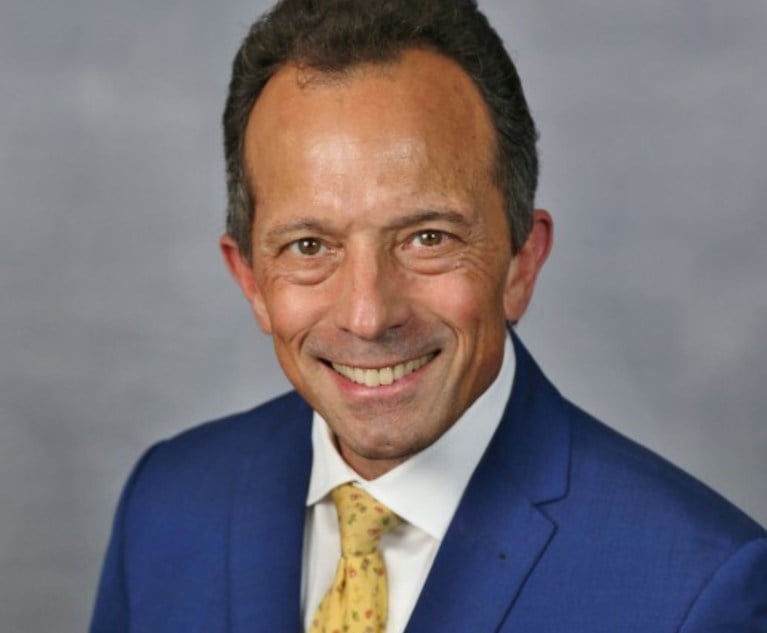 Mexican drug lord Joaquin “El Chapo” Guzman. AP Photo: Marco Ugarte, File.
Mexican drug lord Joaquin “El Chapo” Guzman. AP Photo: Marco Ugarte, File. After Conviction For 'El Chapo,' Prosecutors Take Aim at Other Traffickers
After about five days of deliberations, a federal jury in Brooklyn on Tuesday found Guzmán guilty of all 10 counts against him, included engaging in a continuing criminal enterprise, four counts of international cocaine distribution, related conspiracy counts and other charges.
February 13, 2019 at 06:59 PM
5 minute read
After securing a guilty verdict against Joaquin Guzmán Loera, known as “El Chapo,” the legendary former head of the deadly Sinaloa cartel, federal prosecutors are now turning their sights to other alleged drug traffickers with ties to the cartel.
After about five days of deliberations, a federal jury in Brooklyn on Tuesday found Guzmán guilty of all 10 counts against him, included engaging in a continuing criminal enterprise, four counts of international cocaine distribution, related conspiracy counts and other charges.
Guzmán faces a sentence of life in prison without the possibility of parole on the top count in his indictment, engaging in a continuing criminal enterprise. His sentencing is scheduled for June.
Prosecutors say that, under El Chapo's rule, the Sinaloa cartel raked in $14 billion; moved massive amounts of cocaine, heroin and methamphetamine into the United States; and left thousands dead.
Adding to the folklore that has surrounded Guzmán over the years was his daring prison escapes and ability to evade capture, such as the time in 2015 that, while being held in a maximum security prison in Mexico, he was able to escape through a tunnel that led up to the shower in his cell.
But U.S. Attorney Richard Donoghue of the Eastern District of New York said while speaking to reporters Tuesday after the jury returned the verdict that the sentence will be one “from which there is no escape.”
Donoghue said that “endemic corruption” allowed the Sinaloa cartel to operate on such a massive scale—Alex Cifuentes Villa, who worked as one of Guzmán's lieutenants, testified that the cartel paid a $100 million bribe to former Mexican President Enrique Peña Nieto.
A conviction for Guzman does not spell the end of the Sinaloa cartel, drug enforcement officials told the Associated Press; it still has a narcotics distribution network that reaches across the globe and into U.S. cities.
But Donoghue said the trial, which included testimony from 14 cooperating witnesses, “pulled back the curtain” on international drug trafficking.
“This is a day of reckoning, but there are more days of reckoning to come,” Donoghue said.
Days of reckoning could be coming for two other alleged drug traffickers that were swept up in indictments against Guzmán and other cartel members, both of whom are facing indictments in the Southern District of New York and are awaiting extradition to the United States.
They are Mykhaylo Koretskyy, a Ukrainian-born trafficker who is also known by the aliases “Russian Mike” and “Cobra” who is being held on Curacao; and Stephen Tello, who is also known as “Catboy” and who is being held in Canada.
Some of the evidence presented in the 12-week trial against Guzmán in the Eastern District of New York was drawn from the sprawling indictment filed in 2009 against him and some his henchmen in the Eastern District of New York and several other jurisdictions.
Among them was Vicente Zambada Niebla, known as “El Vicentillo,” who pleaded guilty to drug conspiracy charges and testified against Guzmán last month during the trial. Zambada is scheduled to be sentenced in April in the Northern District of Illinois.
Jeffrey Lichtman, who was part of Guzmán's defense team in the Eastern District, said Guzmán is appealing the conviction to the U.S. Court of Appeals for the Second Circuit. Additionally, Lichtman is representing Koretskyy and said he was doing so before he was hired onto Guzmán's defense team.
Lichtman said Koretskyy, who faces a charge of conspiring to import cocaine into the U.S. from 2008 to 2014, is not guilty of the charges. “We're looking forward to our day in court,” Lichtman said.
Barry Slotnick, a veteran defense attorney who is of counsel at Buchanan Ingersoll & Rooney and whose past clientele includes subway vigilante Bernhard Goetz, said defense attorneys in cases like Guzmán's would be aware it was likely that the defendant's reputation was known to jurors. But they also know that prosecutors must rely on the testimony of witnesses who either have or are alleged to have broken the law themselves.
“You have to convince them that now, maybe for the first time in their lives, they're telling the truth,” Slotnick said of prosecutor's job.
But Slotnick said that with regard to the cases against the other Sinaloa-affiliated traffickers, the cases will likely depend on the same evidence used in the Guzmán's, and thus the trial transcript could be a benefit to defense attorneys, as it could be used to go after the government's witnesses on cross examination if they change their stories or make new admissions.
This content has been archived. It is available through our partners, LexisNexis® and Bloomberg Law.
To view this content, please continue to their sites.
Not a Lexis Subscriber?
Subscribe Now
Not a Bloomberg Law Subscriber?
Subscribe Now
NOT FOR REPRINT
© 2024 ALM Global, LLC, All Rights Reserved. Request academic re-use from www.copyright.com. All other uses, submit a request to [email protected]. For more information visit Asset & Logo Licensing.
You Might Like
View All
Blank Rome Adds 4 From Akerman in Second 2024 White Collar Group Hire
4 minute read
Amazon Accused of Breaching Contract With Company Hired to Help With Supply-Chain Bottlenecks

Top Court Set to Eye Trucking Industry's Claim That E-Logging Device Violates Drivers' Privacy

Trending Stories
- 1Call for Nominations: Elite Trial Lawyers 2025
- 2Senate Judiciary Dems Release Report on Supreme Court Ethics
- 3Senate Confirms Last 2 of Biden's California Judicial Nominees
- 4Morrison & Foerster Doles Out Year-End and Special Bonuses, Raises Base Compensation for Associates
- 5Tom Girardi to Surrender to Federal Authorities on Jan. 7
Who Got The Work
Michael G. Bongiorno, Andrew Scott Dulberg and Elizabeth E. Driscoll from Wilmer Cutler Pickering Hale and Dorr have stepped in to represent Symbotic Inc., an A.I.-enabled technology platform that focuses on increasing supply chain efficiency, and other defendants in a pending shareholder derivative lawsuit. The case, filed Oct. 2 in Massachusetts District Court by the Brown Law Firm on behalf of Stephen Austen, accuses certain officers and directors of misleading investors in regard to Symbotic's potential for margin growth by failing to disclose that the company was not equipped to timely deploy its systems or manage expenses through project delays. The case, assigned to U.S. District Judge Nathaniel M. Gorton, is 1:24-cv-12522, Austen v. Cohen et al.
Who Got The Work
Edmund Polubinski and Marie Killmond of Davis Polk & Wardwell have entered appearances for data platform software development company MongoDB and other defendants in a pending shareholder derivative lawsuit. The action, filed Oct. 7 in New York Southern District Court by the Brown Law Firm, accuses the company's directors and/or officers of falsely expressing confidence in the company’s restructuring of its sales incentive plan and downplaying the severity of decreases in its upfront commitments. The case is 1:24-cv-07594, Roy v. Ittycheria et al.
Who Got The Work
Amy O. Bruchs and Kurt F. Ellison of Michael Best & Friedrich have entered appearances for Epic Systems Corp. in a pending employment discrimination lawsuit. The suit was filed Sept. 7 in Wisconsin Western District Court by Levine Eisberner LLC and Siri & Glimstad on behalf of a project manager who claims that he was wrongfully terminated after applying for a religious exemption to the defendant's COVID-19 vaccine mandate. The case, assigned to U.S. Magistrate Judge Anita Marie Boor, is 3:24-cv-00630, Secker, Nathan v. Epic Systems Corporation.
Who Got The Work
David X. Sullivan, Thomas J. Finn and Gregory A. Hall from McCarter & English have entered appearances for Sunrun Installation Services in a pending civil rights lawsuit. The complaint was filed Sept. 4 in Connecticut District Court by attorney Robert M. Berke on behalf of former employee George Edward Steins, who was arrested and charged with employing an unregistered home improvement salesperson. The complaint alleges that had Sunrun informed the Connecticut Department of Consumer Protection that the plaintiff's employment had ended in 2017 and that he no longer held Sunrun's home improvement contractor license, he would not have been hit with charges, which were dismissed in May 2024. The case, assigned to U.S. District Judge Jeffrey A. Meyer, is 3:24-cv-01423, Steins v. Sunrun, Inc. et al.
Who Got The Work
Greenberg Traurig shareholder Joshua L. Raskin has entered an appearance for boohoo.com UK Ltd. in a pending patent infringement lawsuit. The suit, filed Sept. 3 in Texas Eastern District Court by Rozier Hardt McDonough on behalf of Alto Dynamics, asserts five patents related to an online shopping platform. The case, assigned to U.S. District Judge Rodney Gilstrap, is 2:24-cv-00719, Alto Dynamics, LLC v. boohoo.com UK Limited.
Featured Firms
Law Offices of Gary Martin Hays & Associates, P.C.
(470) 294-1674
Law Offices of Mark E. Salomone
(857) 444-6468
Smith & Hassler
(713) 739-1250






